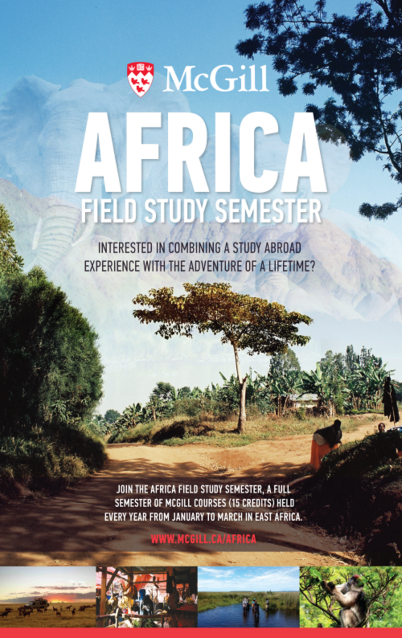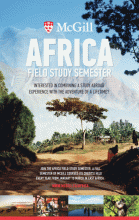1. When is the deadline for application?
See our application page.
2. How many people apply? How many are accepted?
The number of applicants varies from year to year but the program is capped at 38 students. Selection to the program is based on academic performance, and character references. Students must be able and willing to work within groups. Selection may also reflect the program's goal of having a balanced interdisciplinary student body.
3. Are courses on the trip worth university credit?
The credits earned while on the field school are transferable to most North American post-secondary institutions. However, we recommend students check with their home institutions to make sure. Most students will require a letter of permission from their department.
4. Is the $1000 deposit refundable?
The $1000 deposit is fully refundable up to the time of the first installment; it is non refundable thereafter.
5. How many courses should I take while on the field school?
Under normal circumstances, students are expected register for five courses. Courses are offered in three three-week sessions. Your course selection will help us determine scheduling, but be prepared to modify your selection when the schedule is posted.
Students who wish to register for fewer courses should include a letter with their application package, and specify the reasons for this request (for example: disability). Such requests will be reviewed by the program committee. Students are also advised to check with their sources of funding (for example, loan, scholarship, or bursary programs) and with their home universities to confirm whether they are permitted to register for a part-time load of courses. Full-time status is a minimum of twelve McGill credits per term, or four or more three-credit courses; part-time status is less than twelve credits per term.
6. Are there CFSIA field schools during the summer or fall semesters?
No. The field school runs only during the winter semester, from January through March. It is scheduled to run every year, however, it may be cancelled any given year because of safety or logistical reasons.
7. How much does the program cost?
See our fees page.
8. What does the cost include?
See our fees page for more information.
9. What financial aid is available?
Unfortunately there is no financial aid available from the program. However, Quebec resident, Canadian and International students participating in an official exchange, field study semester, study-on-own, research or internship program may be entitled to a bursary for international studies.
For additional information on this bursary click here.
For any additional information on student aid, McGill students (not visiting students) can visit the Scholarships and Student Aid website.
10. Can I use my credit card while in Africa?
Visa cards are widely used in large stores and hotels but less so for American Express and MasterCard. Most small stores will require cash for purchases. Cash advances can be obtained on Visa or MasterCard from banks. Debit cards work in many bank machines (Cirrus and Plus).
11. Where does the program leave from?
The program departs from Montreal. All participants are responsible to arrange transportation to Montreal prior to the beginning of the program.
12. Is there any way of contacting home while I'm on the trip?
- While in Africa, participants can communicate with their friends and family by mail, telephone, cellphone and e-mail.
- The Kenyan postal system can be used, although it is not always efficient or reliable.
- Telephone calls can be made from most cities in East Africa, but they are very expensive. Collect calls cannot be made and most calling cards will not be accepted.
- Many students purchase cell phones in Kenya, and use long distance calling cards to phone home. All incoming calls to cellphones are free in East Africa, including long distance. Service is widespread, but not in all the areas we travel to.
13. Are the fees tax-deductible?
See our fees page.
14. What about health and safety?
Health and safety are overriding concerns. Please read our health and safety page carefully, as all students selected for the program are required to understand and respect the health and safety standards.
15. When will I know if I have been accepted?
Applications are reviewed in May, and notifications will be sent to all applicants by mid June.
16. Can I participate if I have already graduated?
No. Only current undergraduate students can participate in the program. If you will be graduating before the program begins, you may consider extending your degree to, for example, complete a minor.
17. How do I receive a refund for my deposit if I have not been accepted?
Your deposit will be refunded by Student Accounts.

